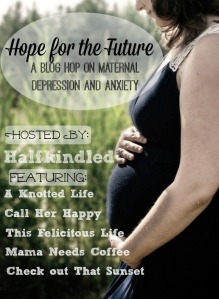
The last time I wrote about postpartum depression, I shared the fact that my struggle was made worse by guilt: motherhood was what I had always wanted, so why wasn’t I thriving? Another mother wrote in to say that she had the opposite problem: she felt guilty because being a stay-at-home mother was not something she had always wanted, and so she blamed her depression on her unpreparedness. My first thought was “oh, my post must not have helped her very much, because she couldn’t relate.” But instead, she found it helpful, because it showed that the fault was not hers; if both of us could be depressed for opposite reasons, the depression must have some origin besides our failings. So true! Your mind can find a reason to make you feel guilty no matter what. Depression can be connected to objective situations, of course; but in the end, it comes on its own and you can never be completely sure why.
I often find comfort in something my mother used to say: If you’re feeling guilty about not being a good enough mother, that means you are a good mother. A bad mother wouldn’t be worrying about it!
I’ve written several times about depression, therapy, and medication (links at the bottom–Wordpress is quirky today), so today I’d just like to focus on how to tell if you’re depressed or just sad, stressed, or have the “baby blues.” These are a few things I’ve noticed through the last few years as indicators of depression; but before all, check with your husband or someone who knows you well! When you’re in the thick of a pregnant, postpartum, breastfeeding, or sleep-deprived state, it can be hard to think straight and realize that you’re not normal. An objective viewpoint is critical.
- Do you still have a sense of humor? If you’re just having a bad day, you can laugh at things going wrong–maybe not that minute, but at least later on. When you’re depressed, nothing seems funny. Your life is awful and there’s nothing funny about it. Humor doesn’t ease the situation at all.
- Likewise, when you’re depressed, nothing is cute, not even your kids. Even when they’re acting normally, you’re constantly aggravated and upset by them. You can’t enjoy them at all because you’re sick of them, they’re just things that make your life harder.
- When you’re having a bad day, you can stop and say to yourself “okay, this day just stinks. Tomorrow will be better. It won’t be like this forever.” When you’re depressed, you don’t have that perspective. You can’t remember things being good before, and you can’t imagine them getting better in the future.
- When it’s just a bad day, simple pick-me-ups can really help: a change of scenery, a snack, exercise, 5 minutes alone, getting distracted with a project, calling a friend, and so on. When you’re depressed, nothing works. You can do all the right things and still feel lousy. Again, that’s because depression doesn’t necessarily come from external circumstances. Sometimes it just comes. That means that you can’t always chase it away without external help.
My computer is freezing up when I try to insert links, so bear with me:
- My original maternal depression post, which includes some helpful guidelines for considering therapy, medication, and self-help books: https://checkoutthatsunset.wordpress.com/2015/05/27/bloghop-good-catholic-moms-and-maternal-depression/
- My post about making peace with medication, which I was very reluctant to try: https://checkoutthatsunset.wordpress.com/2015/03/09/i-dont-want-to-be-on-a-pill-for-the-rest-of-my-life/
- My post about some things that helped during rough periods postpartum, mostly suggested by various therapists: https://checkoutthatsunset.wordpress.com/2016/04/22/7qt-things-that-help/
- My post about why prayer or spiritual counselling may not be enough to cure mental problems, and how God wants you to take advantage of any help you can get, spiritual, secular, or medical: https://checkoutthatsunset.wordpress.com/2016/05/13/why-schools-need-real-counselors/
Please click over to Flourish in Hope (http://www.flourishinhope.com/2016/05/30/my-ppd-story/), a wonderful site I’m just discovering, for other moms’ stories, and thank you so much to them and to Katherine at Half Kindled (http://halfkindled.com/) for organizing this! Let’s all keep each other in our prayers.
